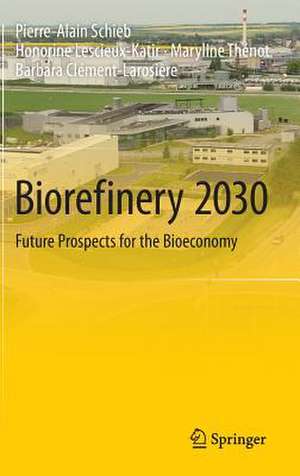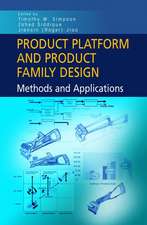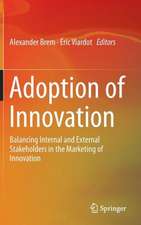Biorefinery 2030: Future Prospects for the Bioeconomy
Autor Pierre-Alain Schieb, Honorine Lescieux-Katir, Maryline Thénot, Barbara Clément-Larosièreen Limba Engleză Hardback – 29 iun 2015
| Toate formatele și edițiile | Preț | Express |
|---|---|---|
| Paperback (1) | 380.07 lei 6-8 săpt. | |
| Springer Berlin, Heidelberg – 19 oct 2016 | 380.07 lei 6-8 săpt. | |
| Hardback (1) | 387.38 lei 6-8 săpt. | |
| Springer Berlin, Heidelberg – 29 iun 2015 | 387.38 lei 6-8 săpt. |
Preț: 387.38 lei
Nou
Puncte Express: 581
Preț estimativ în valută:
74.15€ • 80.57$ • 62.33£
74.15€ • 80.57$ • 62.33£
Carte tipărită la comandă
Livrare economică 21 aprilie-05 mai
Preluare comenzi: 021 569.72.76
Specificații
ISBN-13: 9783662473733
ISBN-10: 3662473739
Pagini: 160
Ilustrații: XXXII, 123 p. 44 illus., 25 illus. in color.
Dimensiuni: 155 x 235 x 17 mm
Greutate: 0.4 kg
Ediția:2015
Editura: Springer Berlin, Heidelberg
Colecția Springer
Locul publicării:Berlin, Heidelberg, Germany
ISBN-10: 3662473739
Pagini: 160
Ilustrații: XXXII, 123 p. 44 illus., 25 illus. in color.
Dimensiuni: 155 x 235 x 17 mm
Greutate: 0.4 kg
Ediția:2015
Editura: Springer Berlin, Heidelberg
Colecția Springer
Locul publicării:Berlin, Heidelberg, Germany
Public țintă
Professional/practitionerCuprins
Preface.- Introduction.- 1 Unique, Multi-Generational Development: A Lesson in Forward Planning.- 2 Changes in the Environment that Made the Bazancourt-Pomacle Biorefinery.- 3 Industrial Symbiosis at the Bazancourt-Pomacle Biorefinery.- 4 Prospects for the Bazancourt-Pomacle Biorefinery Between Now and 2030.- General Conclusion.
Notă biografică
Professor-Doctor Pierre-Alain Schieb is an expert in the field of strategic foresight, new technologies innovation, infrastructures and risk-management. He has held different managerial positions such as Director/Dean of a French Graduate School (Rouen), Executive VP of International Affairs for an international retailing group and more recently Head of OECD Future Projects (1994-2012).
Honorine Lescieux-Katir is a research engineer at the NEOMA Business School Chair in Industrial Bioeconomy. She earned a PhD in Economics from the University of Paris 2. Her research areas include political economics, governance and the bioeconomy. Her interests include the biorefinery concept and its business and economic models.
Maryline Thénot has extensive experience in consulting for international companies, and also as a professor. She has a PhD in Management Science from the University of Reims Champage-Ardenne. She is Head of the Finance Department at NEOMA Business School. Her research areas include institutional change, the cooperative model and the governance and more particularly industrial strategy, of major agricultural cooperative groups.
Until recently, Barbara Clément Larosière was a research engineer at the NEOMA Business School Chair in Industrial Bioeconomy. She currently works as a research and development project manager in the food industry. She completed a PhD in Engineering Science from the Ecole Centrale de Paris.
Honorine Lescieux-Katir is a research engineer at the NEOMA Business School Chair in Industrial Bioeconomy. She earned a PhD in Economics from the University of Paris 2. Her research areas include political economics, governance and the bioeconomy. Her interests include the biorefinery concept and its business and economic models.
Maryline Thénot has extensive experience in consulting for international companies, and also as a professor. She has a PhD in Management Science from the University of Reims Champage-Ardenne. She is Head of the Finance Department at NEOMA Business School. Her research areas include institutional change, the cooperative model and the governance and more particularly industrial strategy, of major agricultural cooperative groups.
Until recently, Barbara Clément Larosière was a research engineer at the NEOMA Business School Chair in Industrial Bioeconomy. She currently works as a research and development project manager in the food industry. She completed a PhD in Engineering Science from the Ecole Centrale de Paris.
Textul de pe ultima copertă
This book investigates the functioning and ecosystems of biorefineries and assesses the potential of the industrial bioeconomy. The authors present a case study of the biorefinery at Bazancourt Pomacle, near Reims, France, as an outstanding illustration of the creation, work processes, financing, provision of environmental services, competitive benefits and future prospects of a bioeconomy. Analysing the case of Bazancourt Pomacle, the authors show the wide range of products produced by integrated biorefineries such as food, bioenergy, molecules for cosmetics and nutrients for agricultural use. They also analyse Bazancourt Pomacle as an open innovation platform, which encompasses several layers of R&D, including three department chairs from leading engineering and business schools in France. Illustrating a number of global success stories that started in Bazancourt Pomacle, the authors also investigate the provision of pilot- and demonstration plants as inescapable steps in the scaling-up process from the lab to industrial scale. The book provides a systematic overview of the lessons learned, as well as data on an industrial bioeconomy. Investors, decision- makers, public-policy shapers, analysts and scholars will learn about the history, actors, economics, industrial symbiosis, role of cooperatives, R&D and future prospects of a world-class biorefinery and bio-based cluster in Europe.
Caracteristici
Explains in non-technical terms why biorefineries are the cornerstone of an industrial bioeconomy Offers significant data on the history and economics of a world-class biorefinery and bio-based cluster in Europe Describes the case of an integrated and territorial biorefinery coupled with R&D and an innovation platform Includes supplementary material: sn.pub/extras














